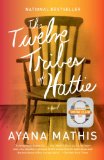Summary | Excerpt | Reading Guide | Reviews | Beyond the Book | Readalikes | Genres & Themes | Author Bio

Ruthie
1951
Lawrence had just given the last of his money to the numbers man when Hattie called him from a public telephone a few blocks from her house on Wayne Street. Her voice was just audible over the street traffic and the baby's high wail. "It's Hattie," she said, as though he would not recognize her voice. And then, "Ruthie and I left home." Lawrence thought for a moment that she meant she had a free hour unexpectedly, and he might come and meet them at the park where they usually saw each other.
"No," she'd said. "I packed my things. We can't . . . we're not going back."
They met an hour later at a diner on Germantown Avenue. The lunch rush was over, and Hattie was the lone customer. She sat with Ruthie propped in her lap, a menu closed on the table in front of her. Hattie did not look up as Lawrence approached. He had the impression that she'd seen him walk in and had turned her head so as not to appear to be looking for him. A cloth satchel sat on the floor next to her: embroidered, somber hued, faded. A bit of white fabric stuck up through the latch. He felt a rush of tenderness at the sight of the bag flopping on the linoleum.
Lawrence lifted the satchel onto the seat as he slid into the booth. He reached across and tickled Ruthie's cheek with his finger. He and Hattie had never discussed a future seriously. Oh, there had been plenty of sighs and wishes in the afternoon hours after they made love: they had invented an entire life out of what-ifs and wouldn't-it-be-nices. He looked at her now and realized their daydreams were more real to him than he'd allowed himself to believe.
Lawrence wasn't a man who got hung up on ideals or lofty sentiment; he had lived pragmatically as far as his emotions were concerned. He had a car and nice suits, and he had only infrequently worked for white men. He left his family behind in Baltimore when he was sixteen, and he had built himself up from nothing without any help from anyone. And if he had not been able to save his mother from becoming a mule, at least he had never been one himself. For most of his life, this had seemed like the most important thing, not to be anybody's mule. Then Hattie came along with all of those children, that multitude of children, and she didn't have a mark of them on her. She spoke like she'd gone to one of those finishing schools for society Negro girls that they have down south. It was as though she'd been dropped into a life of squalor and indignities that should not have been hers. With such a woman, if he would only try a bit harder, he might become a family man. It is true that he had not met Hattie's children, but their names— Billups and Six and Bell— were seductive as the names of foreign cities. In his imagination they were not so much children as they were small docile copies of Hattie.
"What happened?" he asked Hattie. Ruthie kicked at her swaddling. She looked very like him. The old wives' tale says babies look like their fathers when they are new to the world. Ruthie was light-skinned like him and Hattie, lighter than August. Of course, Lawrence had not seen Hattie's other children and could not know that most of them were this same milky tea color.
"Did August put his hands on you?" Lawrence asked.
"He's not that kind of man," she answered sharply.
"Anybody is, if his manhood is wounded enough."
Hattie looked at him in alarm.
"A lot of men, I mean," Lawrence said.
Hattie turned her face to the window. She would need money—that was certain—and they would be able to spend more time together now that August knew the truth. Lawrence could put her up somewhere. It occurred to him now that his choices were two: run from the diner and never see her again or become, all at once, a man of substance and commitment.
Excerpted from The Twelve Tribes of Hattie (Oprah's Book Club 2.0) by Ayana Mathis. Copyright © 2012 by Ayana Mathis. Excerpted by permission of Knopf, a division of Random House, Inc. All rights reserved. No part of this excerpt may be reproduced or reprinted without permission in writing from the publisher.
Your guide toexceptional books
BookBrowse seeks out and recommends the best in contemporary fiction and nonfiction—books that not only engage and entertain but also deepen our understanding of ourselves and the world around us.